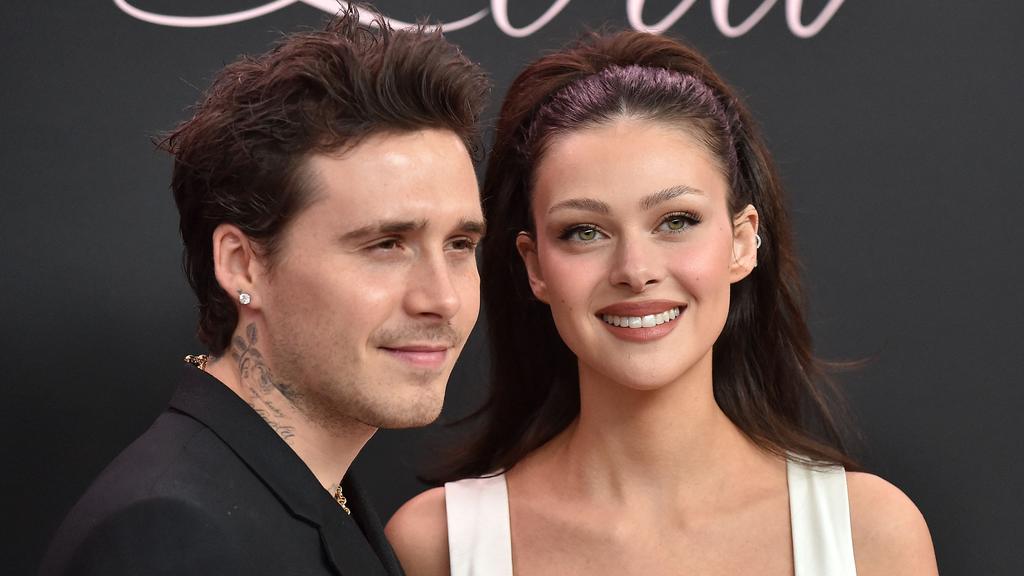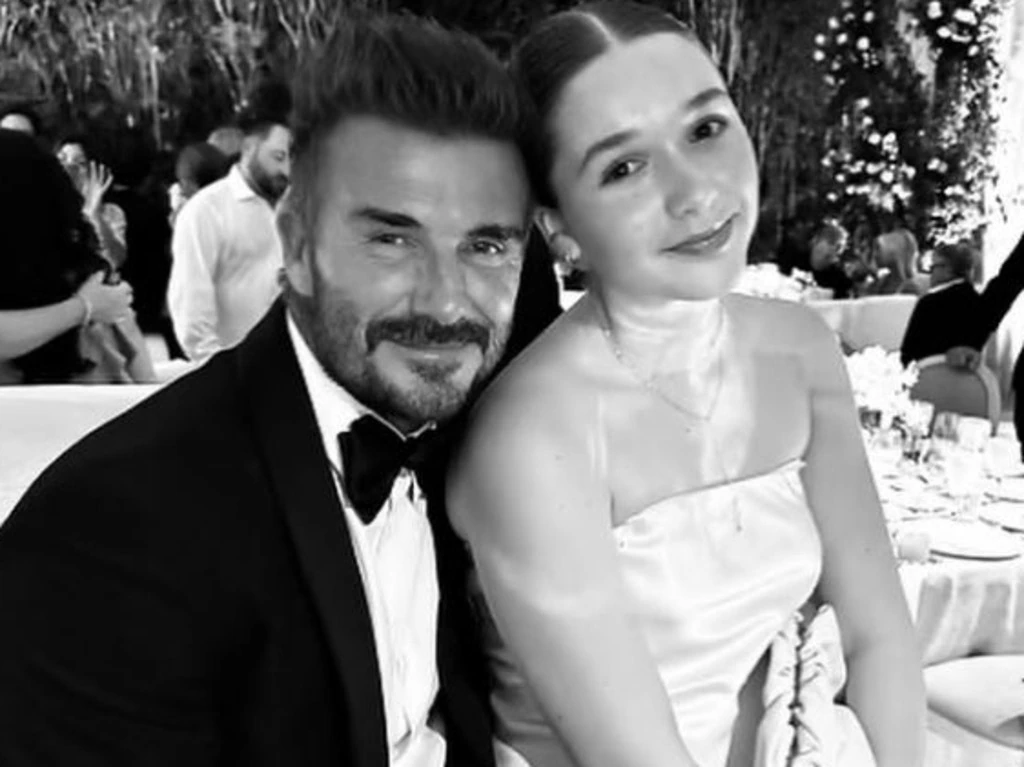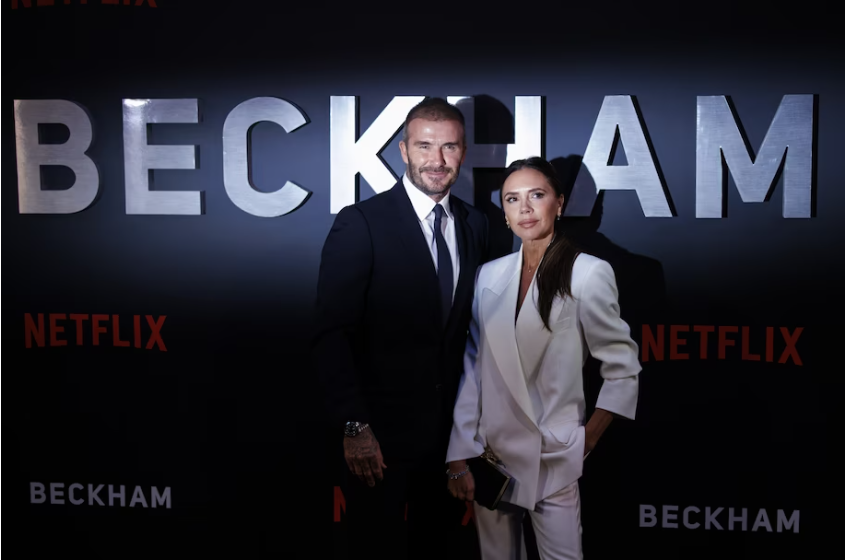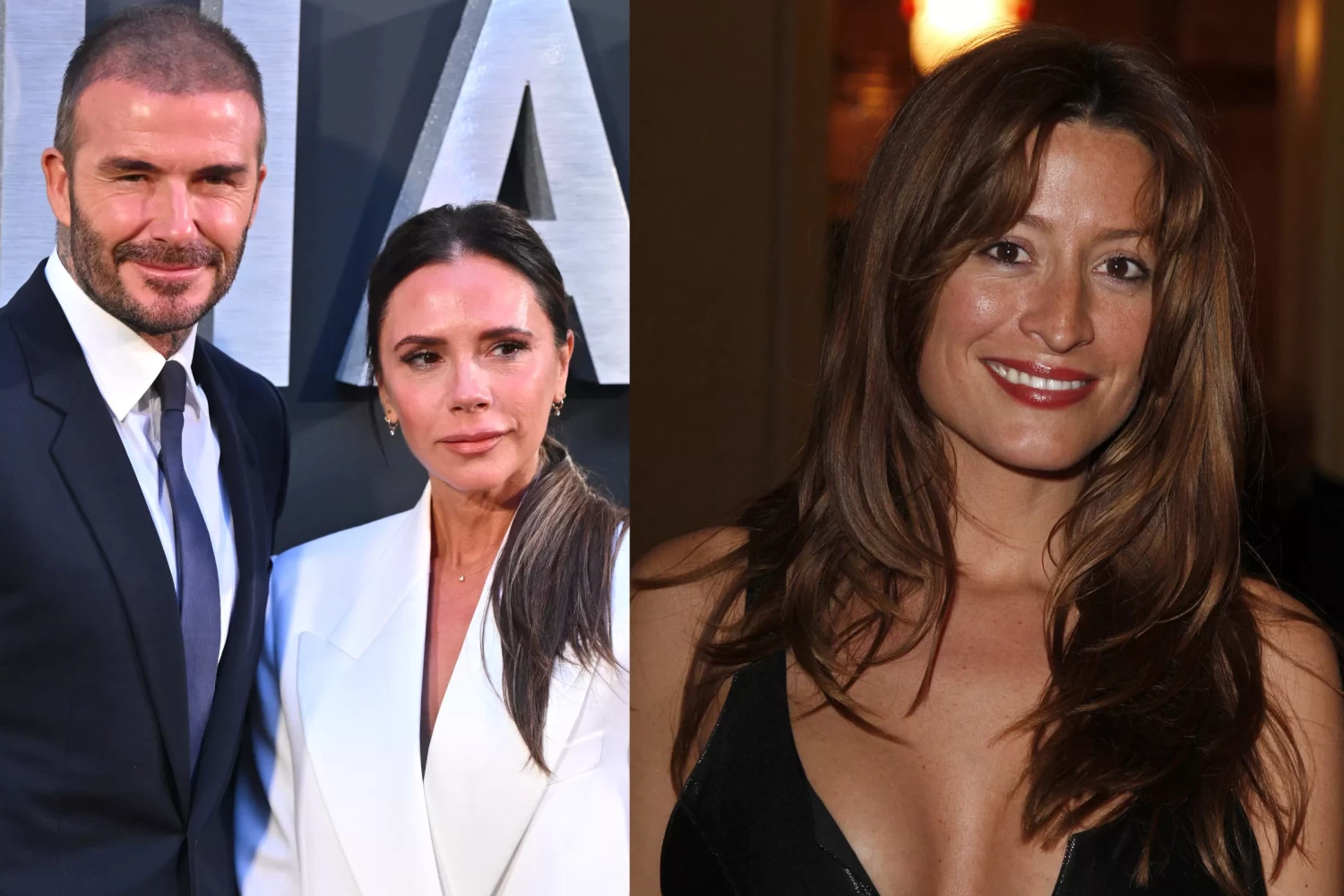This article is more than
1 year old“Beckham” Shows Us How David and Victoria Beckham See Themselves
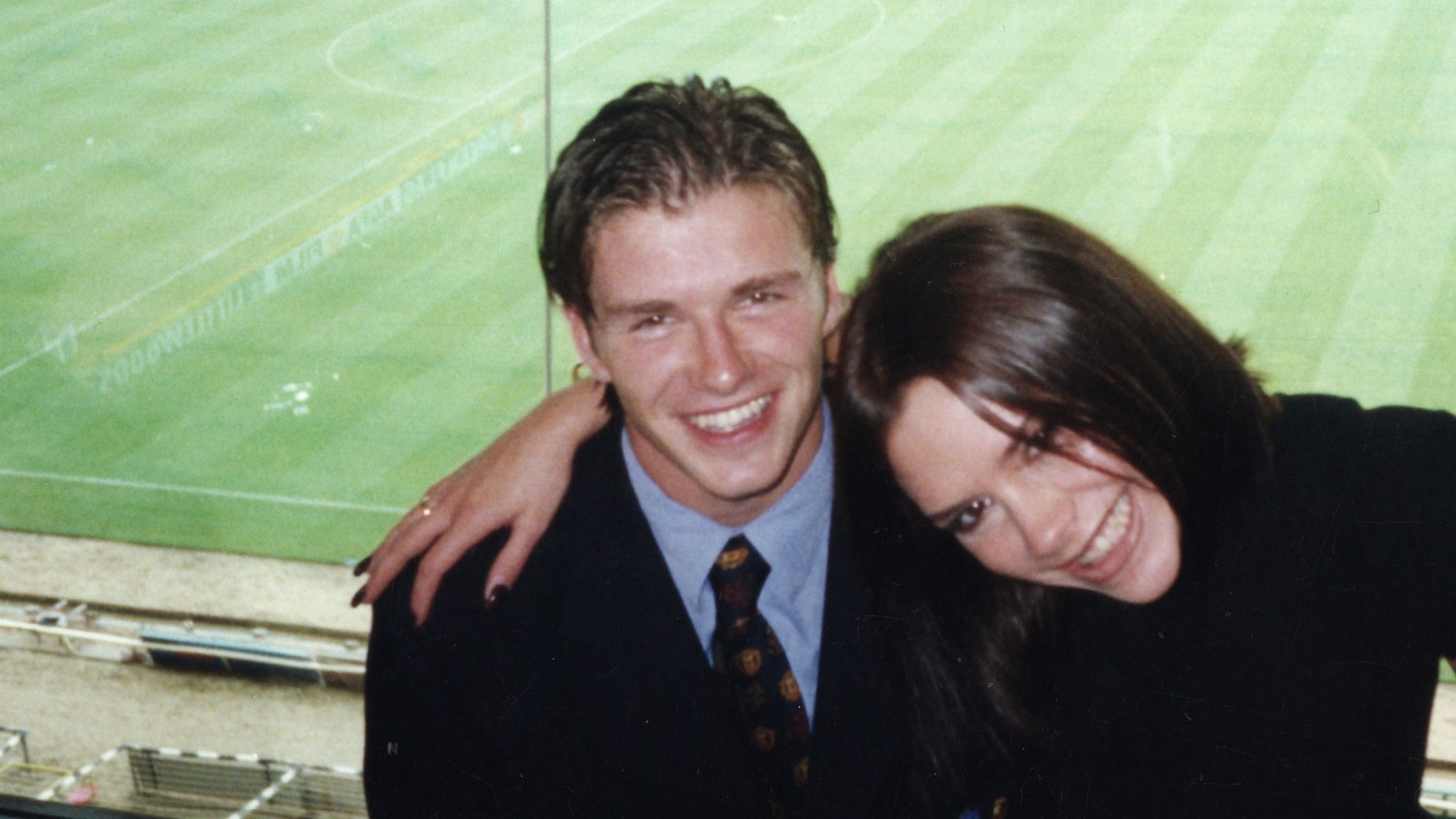
Posh and Becks, as the tabloids called them—nice short words, great big headlines—were a celebrity match made in heaven. They were also a match made in David’s fantasies, it turns out, even before the couple’s first encounter. He tells the documentary’s director, Fisher Stevens, about seeing a Spice Girls video while he and Neville were idly watching TV one day. “I turned round to Gary, I went, ‘See that one there? I’m gonna marry that one,’ ” David remembers. (The documentary suggests—and forensic YouTubing confirms—that the video in question was for “Wannabe,” the group’s multiplatinum début single, from 1996. It includes the characterization of Victoria as “Easy V. who doesn’t come for free / She’s a real lady,” and shows her sporting her signature look of disdain.) Neville tells Stevens, “I suppose that most blokes have done that in their life. Looked at a television set and said, ‘I like her.’ They don’t fucking end up with them.” But David was already attracting attention as a gifted, and good-looking, young player, and destiny took its course when Victoria attended a Manchester United game—an outing likely undertaken in her capacity as a Spice Girl rather than a civilian, because, as she firmly informs Stevens in one of numerous interviews he conducted with both of the Beckhams over two years, “I am not into football. At all. I wasn’t into football then, I am not into football now.”
Even if you were not into football then and you are not into football now, “Beckham” makes for fascinating viewing—as a document of the late nineties and early two-thousands in the U.K., with its Brit-pop and its Blairy optimism; as a record of a moment when the use of private jets and the acquisition of luxury goods by newly wealthy celebrities might have been regarded as crass but wasn’t yet deemed ethically criminal; as a portrait, albeit a flatteringly partial one, of a long-enduring marriage between famous people who seem genuinely to enjoy and admire one another; as a reminder of the extent to which the tabloids and their guns-for-hire—metaphorical, this is Britain—went in pursuing their quarry. Among the many sometimes starry interviewees—they range from Ronaldo Nazário, Beckham’s onetime teammate at Real Madrid, to Anna Wintour, in her capacity as the person who put the Spice Girls on the cover of Vogue—two standouts are Eamonn and James Clarke, a pair of paparazzi brothers from Manchester. They wear matching beards and drink from matching coffee mugs, and, when asked how they feel about the photographs they took in 1999 of David cradling the Beckhams’ infant son, Brooklyn, in his arms as he carried him to a waiting vehicle, they have matching auras of shame: “You wouldn’t do it now,” they offer, inadequately.
Commentators have pointed out that the series was produced by Beckham’s company, which may explain why it skirts some of the more questionable endeavors undertaken by the player, such as being an ambassador for Qatar, a country with a problematic human-rights record that controversially hosted the 2022 World Cup—a role for which he reportedly signed a multimillion-dollar deal. (Stevens says that he asked Beckham about it but his answer “wasn’t brilliant enough to put in the film.”) It’s possible to see the documentary’s provenance as part of its strength: “Beckham” shows us how the Beckhams see themselves, and how they want to be seen. In this respect, the royal couple who come most readily to mind, as one watches the sometimes teary unspooling of intimate disclosures from handsome people sitting on expensive couches in covetable neo-rustic interiors, is not Charles and Diana but that other much misunderstood, oft-pilloried, fame-blasted couple, Harry and Meghan.
The Beckhams are not quite able to say, as the Duke and Duchess of Sussex did in their own Netflix docuseries, that this was their first opportunity to tell their story on their terms. Both have published books: among his, the dubiously named autobiography “My Side”; among hers, the more enticingly titled fashion-and-beauty guide “That Extra Half an Inch: Hair, Heels and Everything in Between.” They have participated in countless other authorized media engagements, including one held to announce their own engagement, a press conference at a countryside spa. “I’m with the man I know I’m going to grow old and wrinkly with,” Victoria said at the time, trolling future generations of life-style journalists on the tweakment-detection beat. Then there was the million pounds they were paid by the magazine OK! for access to their wedding in 1999, not long after Manchester United became the first-ever English team to win, in the same season, the Premier League, the F.A. Cup, and the Champions League; that last victory, over Bayern Munich, saw United struggling throughout the match’s ninety minutes but securing a victory by scoring two goals in injury time. OK! got its money’s worth: the Beckhams’ nuptial extravaganza was held at a castle outside Dublin, with the couple wearing coördinating outfits in a lurid purple for their reception. This is a hue that, after spending decades in color-spectrum Siberia, was recently dignified when Pantone nominated Viva Magenta as 2023’s Color of the Year—take that and stick it, stealth-wealth greige. Honestly, the pictures are fabulous, and the four-month-old Brooklyn in a matching purple Stetson and bib? Adorbs.
Like Harry and Meghan’s series, “Beckham” does lay bare the at times intolerable experience of being one of the most famous people, and half of the most famous couple, in the world. Celebrity—who’d want it? It could be argued that both Beckhams sought fame out, unlike Harry, at least, who had it thrust upon him by birth. They knew that every change of haircut would cause headlines, not to mention a run at the barbershop in the after-school hours. (The floppy fringe, the crewcut, the scuzzy mohawk—every grade-school classroom was once filled with them.) At least some of the time, making headlines seemed to be one of Posh and Becks’s goals, leading to buzz-generating modelling shoots and lucrative endorsements. In the light of their overexposure, some less than fawning attention was inevitable and scrutiny of the couple was fair game, but only up to a point: no one deserves to sit in a football stadium, in support of their loved one, and listen to seventy-five thousand people, overwhelmingly men, chant, “Posh Spice takes it up the arse.”
The plausible solidity of the union between Posh and Becks is one of the heartwarmingest themes of “Beckham.” There’s the cute way he calls her out when she talks about their shared working-class origins. (“Be honest—what car did your dad drive you to school in?” After some prevaricating, she admits, “In the eighties, my dad had a Rolls-Royce.”) There’s the loving way she gets emotional recalling the most ignominious chapter of David’s career—when, in a moment of petulance during a momentous match against Argentina in the 1998 World Cup, he kicked an opponent and was ejected from the game. England lost, and embittered fans subjected David to a months-long campaign of vilification, with everyone from the tabloids to Tony Blair suggesting he was responsible for the national loss. He was hanged in effigy outside one pub. His face was printed in the newspaper as a dartboard. “It pained me so much,” Victoria recalls. “I still want to kill these people.”
The Beckhams have each other’s backs, the series suggests, apart from the period covered in the final episode, when Stevens addresses the allegations that David went behind Victoria’s back with another woman. (Her name, Rebecca Loos, is discreetly cropped out of the documentary’s images, and so is her role in its narrative: she was David’s assistant and translator when he was first transferred to Real Madrid, in 2003.) The couple acknowledge that it was a very difficult period without quite confirming the veracity of the allegations. Their subsequent actions, though, bespeak the striking of a marital deal more binding than a watertight Premier League contract: David left one of the best teams in the world, in Spain, where Victoria was never happy, and joined one of the worst teams in the world, in Los Angeles, which Victoria loved. (He later joined Paris Saint-Germain and retired from the game in 2013.) To be fair, L.A. did suit them both, apart from the way David got confused by the placement of lines on the pitch left over from its use in what he calls American football. “L.A. is like rehab for famous people,” Victoria says—and who in their right mind thinks that rehab is a bad idea, even for famous people? Bless them in their bug-eye sunglasses and Ugg boots at the grocery store.
In fact, the documentary could be understood to be implying that it was actually Victoria who should have been Public Enemy No. 1 after the World Cup loss. She tells Stevens that the night before the match against Argentina she phoned David from Brooklyn, where she was on tour with the Spice Girls, and informed him that she was pregnant with their first child. This is the kind of news that a person who was “into football” might consider saving until after a high-stakes game. The documentary reminds us that Victoria was blamed for other of David’s failings on the pitch when they happened—not only by the tabloids but by Manchester United’s manager, Sir Alex Ferguson. Sir Alex, or “the boss,” as David calls him, is another compelling presence throughout the series, a father figure whom David cannot help loving, in spite of the fact that Ferguson summarily fired him, in 2003, when the Beckham circus got wilder and the Beckham game got sloppier than the boss was willing to tolerate. The blaming of a wicked woman for distracting a good man from his game is, of course, a story as old as Eve, or at least as old as Yoko Ono. Still, the vitriolic criticism of Victoria is an ugly history to revisit. It’s not just history, either. Victoria is, according to one female British columnist reviewing the series, “a charmless, empty gobshite,” who “mooed” that she was bullied at school—an odd choice of verb, given that one might assume the animal-based slur least likely to be lobbed at Posh would be a bovine one.
Funnily enough, Victoria was never credited when David did do something amazing—and the series shows a lot of occasions on which he does something amazing. Because there is also a lot of football in the four episodes—spectacular highlights of the sort to delight even a person who doesn’t like football. At all. I won’t attempt a full tally of the pantheon of grizzled footballing superstars whom Stevens shoots in closeup, to great effect, as they look directly into the camera while watching a replay of a celebrated game—so that we, the viewers on our own, non-luxury couches, can imagine ourselves to be the famous penalty shootout or corner kick. Nor will I attempt to list all the times when David’s right foot brought his team back from the brink or when his surging hopes were dashed at the last moment. I lost track of the number of sequences when a match was condensed into a few thrilling, orchestral-music-enhanced minutes, interrupted by David or some other participant saying something like, “And that’s when everything changed”—which is not to say that I didn’t love every one of them.
There are, inevitably, some regrettable omissions in the series. Stevens might have included a quick minute on Chingford, the suburb on the northeastern fringe of London where David grew up, to allow the kind of granular class-based analysis that would make little sense to an American audience but is the kind of thing that can keep Brits at it for hours. (Can you be working class and drive a Rolls-Royce? Discuss.) A viewer might also want a little more interrogation of David’s tattoos, which are legion, and seemed to proliferate in the course of the series. Was that little one between his ear and his sideburn there from the get-go, or is that just a trick of the very subtle lighting in the sprawling man cave of the Beckhams’ vast converted barn complex in the Cotswold countryside? If, as a teammate suggests in the final episode, football players are addicted to adrenaline, could the tats be David’s substitute rush, a way to prolong the agony and the rewards of his relinquished calling—the game that, he believes, he loved “more than anyone has ever loved it,” and that he was so very good at?
But these are quibbles. The cumulative effect of the series is to suggest that, if David and Victoria were the old Harry and Meghan, they have come through decades of attention far from unscathed, but at least with some of their sense of humor intact. The Beckhams did not have final cut of “Beckham,” but they did get to preview the series, and one hopes that they were as amused as everyone else will be to see the inclusion, at the end of the second episode, of a video showing Neville—the documentary’s sleeper star, by the way—giving a filthy best-man speech at their wedding: “David said that the Spice Girls requested that the Bayern Munich team be present today, and David was puzzled at this request and asked why. He said that the Spice Girls replied that they’d love to meet any men that could stay on top for ninety minutes and still come second.” He shoots! He scores! ♦
New Yorker Favorites
-
In the weeks before John Wayne Gacy’s scheduled execution, he was far from reconciled to his fate.
-
What HBO’s “Chernobyl” got right, and what it got terribly wrong.
-
Why does the Bible end that way?
-
A new era of strength competitions is testing the limits of the human body.
-
How an unemployed blogger confirmed that Syria had used chemical weapons.
-
An essay by Toni Morrison: “The Work You Do, the Person You Are.”
Sign up for our daily newsletter to receive the best stories from The New Yorker.
Keywords
Newer articles
<p>Chinese officials say they "firmly oppose" the platform being divested.</p>
Israel Iran attack: Damage seen at air base in Isfahan
Ukraine ‘will have a chance at victory’ with new US aid, Zelenskyy says
Ukraine war: Kyiv uses longer-range US missiles for first time
Congress passes bill that could ban TikTok after years of false starts
House passes potential TikTok ban that could speed through Senate
Who will be Trump’s VP? A shortlist
How soon could US ban TikTok after Congress approved bill?
Finally, America’s Congress does right by Ukraine
‘LOSING CREDIBILITY’: Judge explodes at Trump lawyers as case heats up
